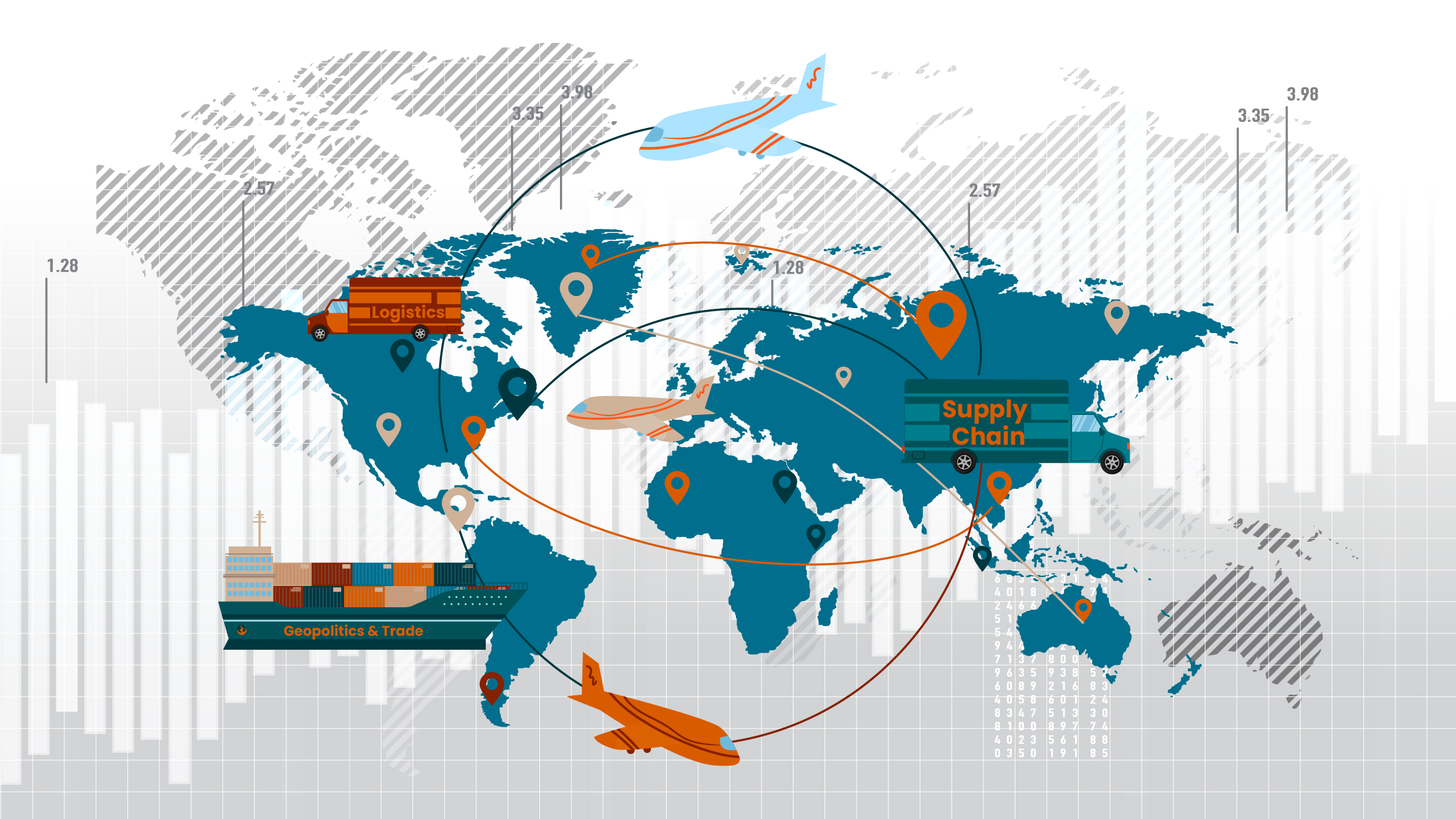Geopolitics and Global Trade: Navigating the Shifting Landscape of Power and Economics
Politics and power, in today’s world, are playing a critical role in changing the global trade landscape. Things are unpredictable nowadays. Countries are getting more nationalistic, trying to protect their economies, and alliances keep changing. The world’s economy is way more divided and competitive than before. Now, it is all about who has got the power, and what they do with it, that determines how trade is going to work.
Just a few decades ago, everyone was pushing to make trade smoother. The WTO, agreements like NAFTA, and the EU were all about tearing down walls and bringing the world closer together. It seemed like we were all working toward the same goal. But now, the vision of free trade is starting to slip away. More countries are getting protective, bringing back tariffs, and just looking out for themselves.
Now it is obvious that trade and politics are stuck together. It is not just about shipping goods and services anymore. Countries are using both political and economic power to stay ahead. And this is changing how the global market works. It is hard to say what is next, but one thing is for sure – it will not be like it used to be.
A World in Transition: The Rise of Economic Nationalism
If we think back to the start of the 21st century, the idea of globalisation was at the core of development. We felt the whole world was coming together, almost like one big global marketplace. Countries were finally starting to open, and organizations like the WTO were seen as the peacekeepers of global trade. China’s joining the WTO in 2001 was a big episode. It was a signal that even developing countries could jump into the global economy and compete on the same level as the major players. Things were looking good – trade picked up, tariffs went down, and borders seemed to matter less. We were all in this together, or so it seemed.
But, as we know, things have shifted. Economic nationalism has made a big comeback, and more countries are pulling away from the idea that globalisation is the solution to everything. People are frustrated. We hear a lot about how globalisation has not really worked for everyone. There is this growing sentiment that while global trade might have benefited big corporations, it has not helped the common people. It has led to the outsourcing of jobs, the destruction of local industries, and, honestly, it has been rough on workers, especially in poorer countries. Thus, people have turned towards more protectionist policies. Countries have started imposing tariffs again and putting up trade barriers to protect what is theirs. It is a big shift in thinking: “Let’s focus on our own economies and worry less about the global system”.
Take the United States as an example. Under the Trump administration, we have seen a dramatic shift towards an “America First” approach. The main idea is simple: put American businesses and workers first, even if that means stepping back from international agreements and deals. It is not just a U.S. thing either – leaders in other parts of the world have started getting on board with similar ideas, looking inward and asking, “What is best for us right now?”. It is not about making the global system work anymore. It is about taking care of the home.
One of the recent examples of this shift is the U.S.-China trade war and reciprocal tariffs. Two of the world’s largest economies are clashing head-on over tariffs, intellectual property, technology, and so much more. It is not just about trade anymore. It has become a fight for influence and power. To get the upper hand, Trump is imposing additional tariffs on all countries, including the least developed countries, and in some cases, forcing countries to take measures that may affect their trade relations with China. Trade is not just about goods and services crossing borders anymore- it is about who can shape the rules of the global game. The trade war, the tariffs, the back-and-forth moves – they are all about trying to get ahead, to lock in an advantage in this new, more fragmented global economy.
Geopolitics and Trade: The Interplay of Power
Let’s be real – geopolitics and trade have always been connected. But today, that connection is more obvious than ever. Trade is all about who controls what and who gets to call the shots in the world economy. The political and economic power a country has plays a huge role in the global trade game.
And at the centre of this shift is China. The country’s growth has been nothing short of remarkable. Just a few decades ago, China was not even close to where it is today. Now, China is the second-largest economy in the world and is playing a central role in shaping global trade. One of the big things China has done is launch the Belt and Road Initiative (BRI) in 2013. It is an initiative for building new infrastructure, creating new trade routes, and basically connecting Asia, Africa, and Europe in ways we have never seen before. But here is the thing – it is not just about the money or the infrastructure. The BRI is also about China spreading its influence and making sure it has more control over key resources, markets, and trade routes.
China’s rise is shaking up the old order. For decades, the U.S. has been the dominant force in global trade. But as China’s economy grows, it is challenging that dominance. Trade, these days, is about who gets to make the trade rules. That is why the U.S.-China trade war has become so significant. It is not just about tariffs – it is about securing power. We are watching two major global powers fight for the top spot, and trade is the tool they are using to make their moves.
The trade war is not just limited to economics; it is about intellectual property, technology, and even national security. The U.S. has cracked down on Chinese tech companies like Huawei, saying their tech could be used for spying. At the same time, China has been using its growing economic clout to push for more say in global institutions, like the WTO and the UN. It is all about holding power and showing it to the world.
The Role of Technology in Geopolitical Trade Shifts
Technology is playing a huge role in the changes we are seeing in global trade today. It is not just about physical goods anymore – now it is about who leads the tech that powers the global economy. Whether we are talking about e-commerce, digital trade, or new supply chains driven by technology, everything is changing. And the race for control over tech is on.
The U.S. and China are at the centre of this tech race. Both countries are trying to dominate in fields like artificial intelligence, 5G, and quantum computing. These technologies are game changers. They are making business faster, smarter, and more efficient. But there is a catch. Whoever controls these technologies does not just get an economic boost – they get a political advantage too. The race to control the future of tech is just as much about national security and global influence as it is about business.
Let’s take 5G, for example. The U.S. has been working hard to block Chinese companies such as Huawei from entering the 5G market, claiming their technology could pose a national security risk. China, of course, argues that the U.S. is using national security as an excuse to stifle its rise. This is not just about tech companies competing for business – it is about which country controls the future of communications, data, and global security.
Another area of competition is semiconductors. These tiny chips power everything – phones, computers, military tech, you name it. Both the U.S. and China are fighting to control semiconductor production, and whoever wins will hold a major advantage in the global economy. This race is pushing both countries to rethink their trade policies, their supply chains, and their strategies for protecting their intellectual property.
The Future of Global Trade: A World of Fragmentation and Strategic Alliances
Global trade is not going to stay the way it is now. Instead of one big world market, we will see countries break off into their own groups. It will be little teams, each with its own way of doing things. No more “let’s all trade freely” and “hope for the best”. It will be more like “you and I share interests, let’s make this work”.
What is happening now is mostly because countries are looking out for themselves. Think security, tech, not depending on others too much. They are thinking, “Why should we just open up to everyone?”. Instead, they are looking for deals with countries they trust, or those who need the same things. It is more about what works for me, and a lot less about some global dream of equity.
The U.S., China, and the EU are still going to be there, fighting for power. But the interesting part will be how the smaller economies handle this. They will have to figure out where they stand in this transition. How do they get a good deal without just following the big guys? It is a balancing act. One foot in politics, one in economics, and maybe a little in security. They cannot just keep doing things the old way.
Conclusion
Global trade is disintegrated by different blocks right now, each doing their things that make sense to them. We are in the middle of some big, confusing change. We do not know where it is going, but we do know things are altering dramatically. At this moment, the powerhouses are trying to call the shots for all. But others will need to figure out where they fit in all this. They will have to rethink how they make deals, who they work with, and how they survive in a world where the rules are not what they used to be. They will need to adjust to what is coming.
 Author’s Biography:
Author’s Biography:
Zubayer Hossen, Programme Director, South Asian Network on Economic Modeling (SANEM). Email: zubayerhossen14@gmail.com


